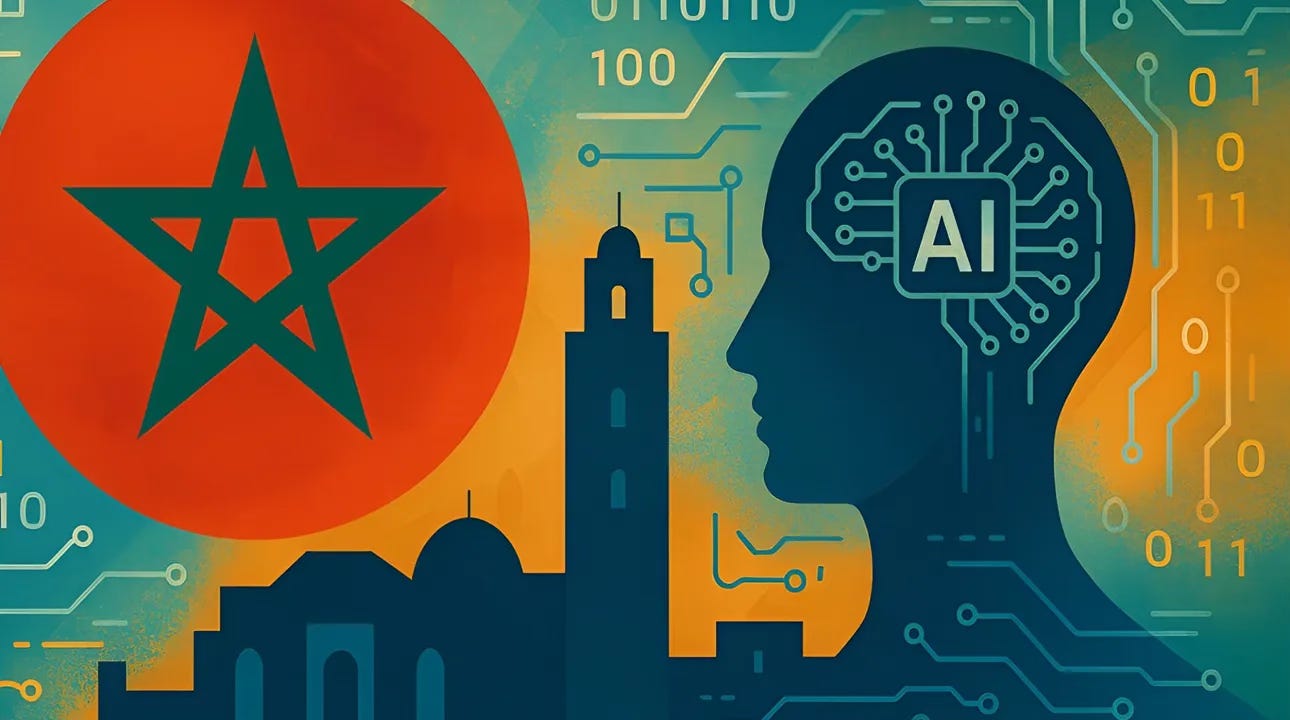Kenya opens Qubit hub; UK funds £1M EthiopiAI challenge
Weekly News Digest ...
Good morning, and welcome to this week’s issue of Africa AI News – Weekly News Digest.
This week sees a few major policy initiatives, with a key one being Morocco looking to create an AI ethics framework and possibly even an actual AI LLM platform that would become the gold standard of Moroccan AI development.
MiddleEastAINews.com unpacks the announcement here.
Zambia has belatedly launched it’s AI policy, with an intention to drive GDP growth by 8% (Likely? You tell us, seeing Egypt expects AI to become an 8% part of its overall GDP growth figure).
Big news out of Kenya, with the opening of a government-funded AI R&D centre in Nairobi. And if you’re in Ethiopia — a million pound grant from the UK to drive Ethiopia’s AI future. Applications are open now.
On with this week’s issue!
/Roger
Policy
Morocco plans sovereign AI platform with UNESCO ethics
#Morocco #sovereignAI – Morocco’s Ministry of Digital Transition is working with the National Commission for the Control of Personal Data Protection to launch a sovereign AI framework. Built on AI models tailored to Moroccan languages and laws, the platform aligns with UNESCO’s AI ethics guidelines. (Middle East AI News)
Zambia launches AI blueprint to drive jobs and growth
#Zambia #policy — The government has unveiled its National AI Strategy (2024–2026) to boost economic growth and youth employment. The plan includes innovation hubs, digital skills training, and pilot projects in agriculture, health, and education. Officials estimate AI could raise GDP by nearly 8% by 2030. (Ecofin)
Govt confirms AI guideline near completion
#Tanzania #policy — The Tanzanian government is finalising a national framework to steer responsible AI adoption. Ongoing initiatives include advanced training at UDOM’s AfriAI Lab and the creation of a new digital and AI institute in Dodoma. The measures aim to strengthen skills and provide a hub for AI innovation. (Daily News)
Egypt sets 7.7% AI GDP target by 2030
#Egypt #AIstrategy – Egyptian Communications Minister Amr Talaat confirmed plans to raise AI’s share of GDP to 7.7% by 2030. Egypt’s national AI strategy includes training 30,000 AI specialists, fostering 250 startups, and launching policies on cloud, open data and responsible AI. (Daily News Egypt)
Nigeria joins global privacy forum on AI and data
#Nigeria #policy — The Nigeria Data Protection Commission (NDPC) joined 148 authorities from 95 countries at the 47th Global Privacy Assembly in Seoul. Led by Dr. Vincent Olatunji, the delegation engaged in talks on safeguarding privacy amid AI adoption and held bilateral meetings to share best practices. The move underscores Nigeria’s ambition to balance digital innovation with citizen protection. (iAfrica.com)
Funding
UK launches £1m EthiopiAI call for proposals
#Ethiopia #funding — The UK’s Foreign, Commonwealth & Development Office (FCDO) has opened applications for the EthiopiAI Programme, with over £1 million available for responsible AI projects. Proposals, due by 3 October 2025, should target health, education, humanitarian aid, economic growth, or climate action. The initiative aims to integrate AI into Ethiopia’s public sector, strengthening services and citizen resilience. (Opportunities For Youth)
Education
Morocco partners with Mistral to grow AI skills
#Morocco #education — Morocco has signed an MoU with French firm Mistral AI to train local talent, support applied research, and promote ethical AI use. The initiative, under the “Digital Morocco 2030” strategy, seeks to create 270,000 digital jobs and $4.45 billion in exports by 2030. The deal is also expected to spark startup growth and strengthen national digital infrastructure. (Ecofin Agency)
Egypt to roll out AI curricula in schools by 2025
#Egypt #education — Egypt will introduce artificial intelligence curricula in primary, middle, and secondary schools from the 2025–2026 academic year. Education Minister Mohamed Abdel Latif said the initiative, announced at the Arab AI Forum, will focus on applied learning, ethics, and digital skills. Teacher training and new laboratories are being prepared to ensure effective implementation. (Egyptian Streets)
Kenya opens Qubit Hub to drive AI innovation
#Kenya #CoEs — Kenya has launched the Qubit Hub Research Centre in Nairobi to boost AI research, development and commercialisation. Aligned with the 2025–2030 National AI Strategy, the hub will provide infrastructure for innovation and expand access to digital opportunities. Officials said supportive policies, including lower power costs, will strengthen Kenya’s role as a regional AI leader. (TechAfrica News)
Applications
Tanzania debuts AI chatbot in election campaign
#Tanzania #applications — The ruling Chama cha Mapinduzi party has launched “Kijani Ilani,” an AI chatbot that answers voter queries on health, education, and infrastructure, ahead of the 29 October election. Analysts caution it may reshape political discourse in unprecedented ways, and with current president, Samia Suluhu Hassan (coming to the office on the death of previous incumbent John Magufuli), facing intense criticism for anti-democratic acts. (Powers of Africa)
Sussex students run AI farming course in Malawi
#Malawi #education — Three University of Sussex students delivered a two-week course in Malawi on AI and electronics for agriculture. Led by PhD student Dexter Shepherd, the programme taught participants to build data-loggers with Raspberry Pi devices and apply machine learning to predict crop health. The initiative aims to support smallholder farmers with low-cost, sustainable solutions. (The Argus)
Zambia’s eShandi expands AI-powered lending to underserved Africans
#Zambia #Fintech — Zambian start-up eShandi is using AI and alternative data to extend loans to individuals and SMEs excluded from traditional banking. The platform analyses mobile money records, smartphone usage, and user behaviour to assess creditworthiness. (iAfrica)
[ This newsletter was human proposed and AI vetoed ]



